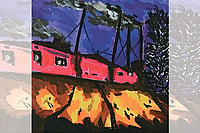Iyer could not have known this when he finished his book but Mohammed Atta, the leader of the September 11 hijackers, had also written his thesis on the Syrian suq while in university at Hamburg. For Atta, the suq was under siege, choked by the westernstyle development all around it—the maze-like underground architecture of shops and tunnels overwhelmed by the glitter of highrise hotels.
However, in Iyer’s case, it is not so much the conflict between cultures but the romance between them that is the more enduring attraction. So it is that when Macmillan emerges from the suq, he finds himself led into a mosque where people are weeping tears of devotion and ecstasy. No fire-spewing mullah discoursing on the need to bring death to the sinful West, only ordinary people, filled with love and loss, revealing their real selves.
A lot of tears are shed in Abandon. The main culprit is Camilla Jensen, a tense and fearful Californian, who becomes the object of Macmillan’s desire. His search for love poems and also love provide the novel its quota of suspense. In his quest for the missing manuscripts, Macmillan visits Syria, Spain, India and Iran. His search for love takes him, in Camilla’s company, to various places in the California hills and the surrounding desert.
As a prolific travel writer, Iyer has always had an eye not only for change but also for congruencies. "One reason why Melbourne looks ever more like Houston," he had written in The Global Soul, "is that both of them are filling up with Vietnamese pho cafes..." To see unity among disparate things is the result of a gift for abstraction. Iyer has that gift aplenty. He shows us that Macmillan’s various pursuits are, in reality, all driven by the same need. Everything in this novel is arranged around the multiple, often contradictory, meanings of the word "abandon". This allows for some dizzying linguistic play, but one cannot help thinking that the relentless punning, especially as a narrative device, would be more suited to the essay, a form at which Iyer excels, than to a novel dealing with people and emotions.
Iyer’s writing is much more satisfying when he presents his characters as travellers. To begin with, he turns the laser of his attention to the traits of the people his characters meet. Here is Macmillan talking to a woman in Paris: "She took a long drag on her cigarette—smoking was how people in Paris punctuated their conversations."
What is even more pleasurable about Iyer’s characters abroad is that we are allowed to experience the richness of the world in profound ways. The book’s closing pages take us to Iran and each person the travellers meet is a revelation. This is a change from the earlier sections. In fact, when reading the last few pages, I began to think that the greatest mystery in Iyer’s book is why he had not written of the people in foreign places instead of those we were stuck with in California.
Over the last few days the images on TV were all of buildings and streets getting bombed in Iraq. Abandon, with its more humane vision of the East-West encounter, is thus a timely novel, although the sad truth is that there are many more tears in the desert cities than even its protagonist had imagined. Tears and oil.


























